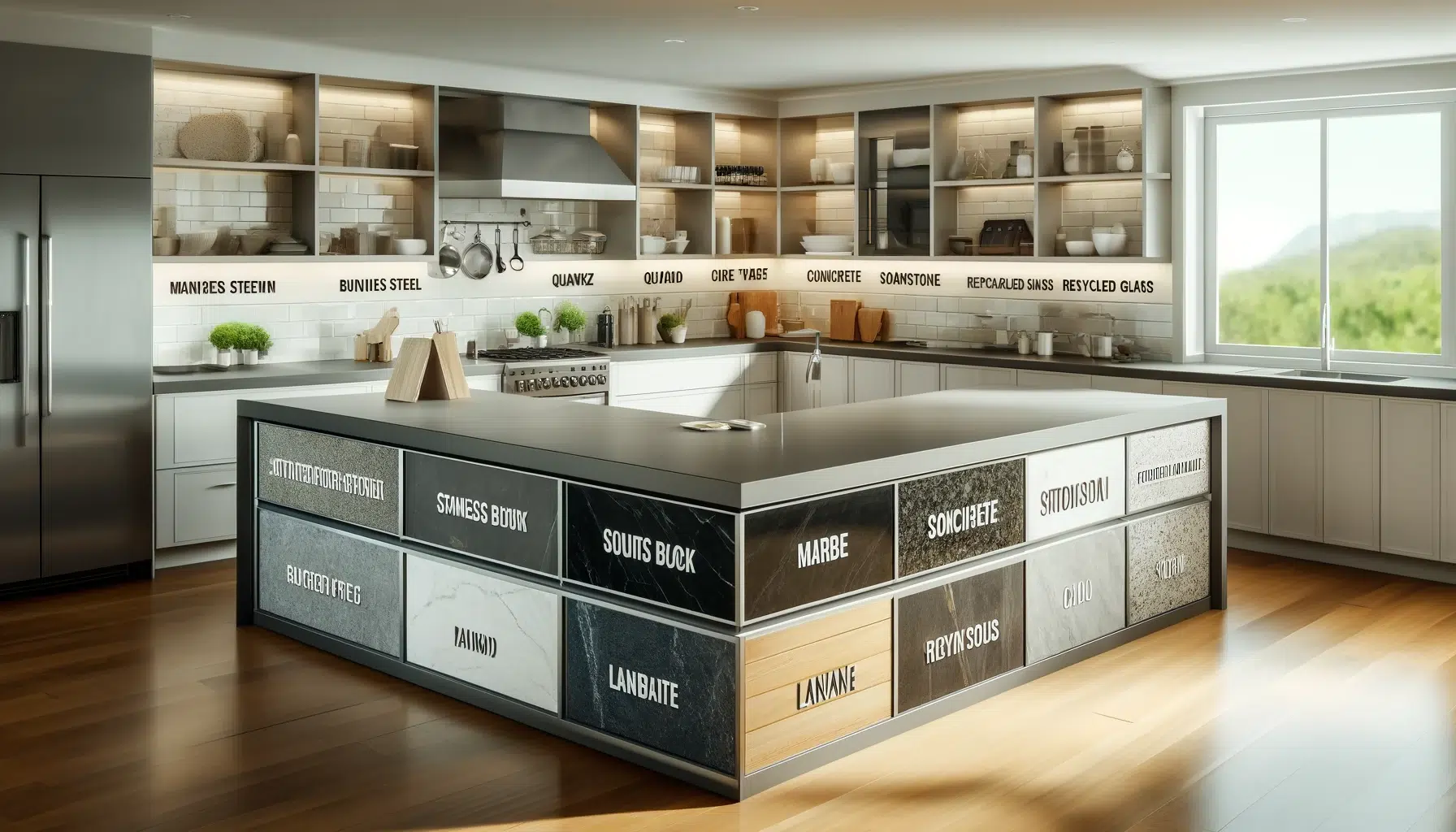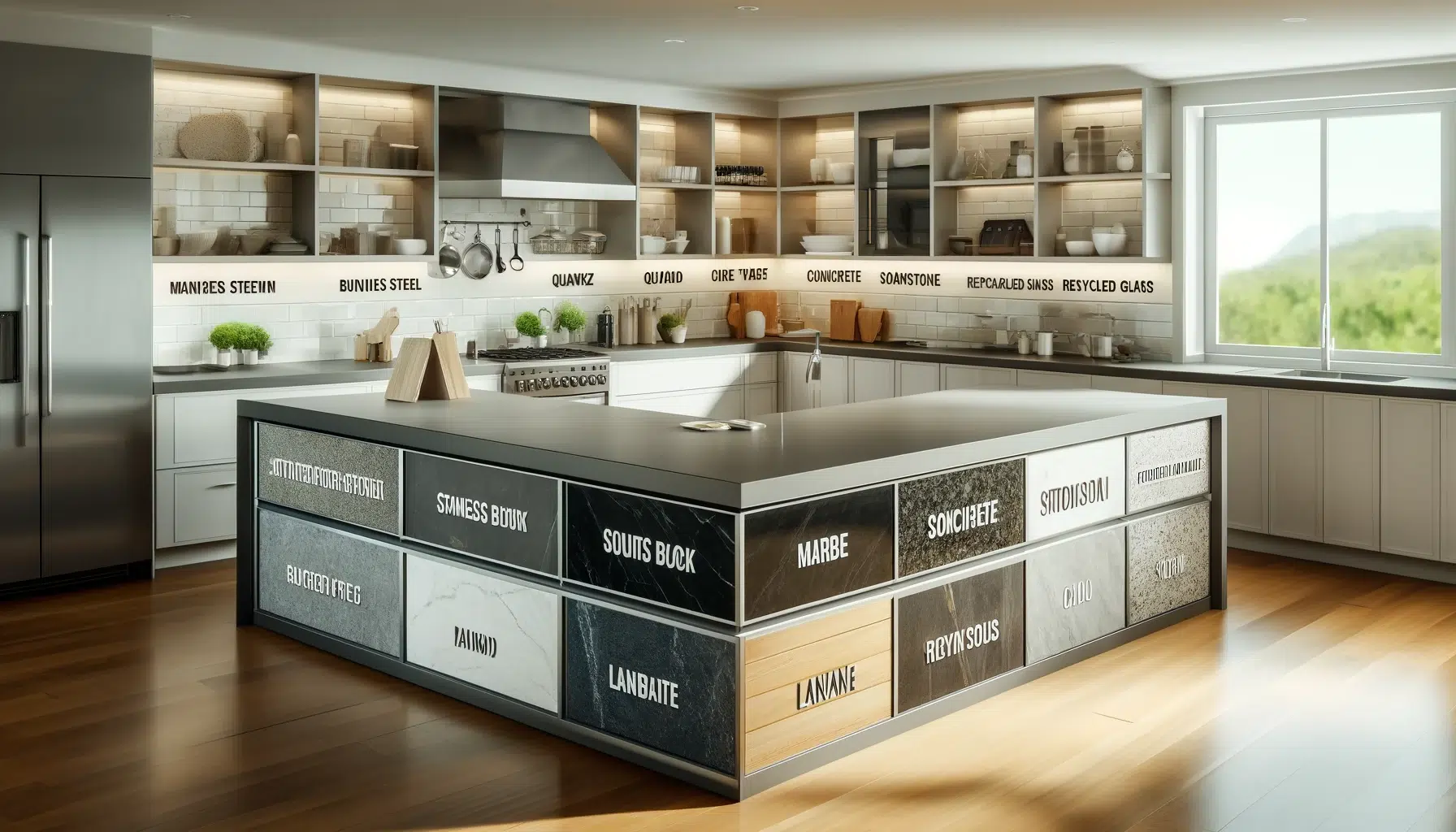10 Durable Kitchen Countertop Materials to Consider
Choosing the right countertop material for your kitchen is crucial for both functionality and aesthetics.
The kitchen is often the heart of the home, where meals are prepared and memories are made.
Therefore, it’s essential to select countertops that not only look great but can also withstand daily wear and tear.
In this comprehensive guide, we explore ten durable kitchen countertop materials, detailing their benefits, drawbacks, and ideal use cases.
1. Granite Countertops: Timeless Elegance
Natural stone countertops, including granite, marble, and soapstone, offer unique and beautiful surfaces that enhance the kitchen’s aesthetic appeal.
They are durable and heat resistant but can be porous and require regular sealing. Natural stone countertops can be quite expensive and heavy, necessitating professional installation. The beauty and uniqueness of natural stone make it a desirable choice for those willing to invest in their kitchen.
Benefits of Engineered Stone Countertops
Engineered stone countertops, such as quartz, provide a non-porous, durable, and low-maintenance option for kitchens. They offer a wide range of colors and patterns, including designs that mimic natural stone. Engineered stone is resistant to stains, scratches, and heat, making it a practical choice for busy kitchens. While generally more affordable than natural stone, engineered stone countertops still offer a high-end look and feel.
Wood Countertops: A Natural Choice
Wood countertops, including butcher block, add a warm and inviting touch to the kitchen. They are ideal for food preparation, offering a forgiving surface that can be easily refinished. However, wood countertops require regular maintenance, including oiling and sanding to address scratches and dents. Their natural beauty and functionality make them a charming choice for traditional and rustic kitchen designs.
Metal Countertops: Sleek and Modern
Metal countertops, such as stainless steel and copper, provide a sleek and modern look that is both durable and easy to clean. They are heat resistant and non-porous, offering a hygienic surface for food preparation. Metal countertops can be prone to scratches and dents, but their industrial appeal makes them a popular choice for contemporary and professional kitchens.
Alternative Materials for Kitchen Countertops
In addition to the traditional materials, several alternative options are available for kitchen countertops, including bamboo, resin, and tile. These materials offer unique benefits and can add a distinctive touch to the kitchen. Bamboo countertops are sustainable and eco-friendly, while resin countertops offer a wide range of colors and patterns. Tile countertops provide a customizable and easy-to-clean surface, but the grout lines can require additional maintenance. Exploring alternative materials allows homeowners to find a countertop that suits their style and needs.
Sustainability in Kitchen Countertop Choices
Sustainability is an increasingly important consideration in kitchen design. Recycled and eco-friendly materials, such as recycled glass, bamboo, and certain types of engineered stone, provide environmentally responsible options for countertops. These materials not only reduce waste but also offer unique and stylish surfaces for the kitchen. Choosing sustainable countertops contributes to a greener home and a healthier planet.
How to Choose the Right Countertop for Your Kitchen
Selecting the right countertop involves balancing aesthetics, functionality, and budget. Homeowners should consider the overall style of the kitchen, the level of maintenance they are willing to commit to, and the specific needs of their household. Visiting showrooms, consulting with professionals, and reviewing samples can help in making an informed decision. Ultimately, the right countertop will enhance the kitchen’s beauty and usability, providing a durable surface for years to come.
Popular Trends in Kitchen Countertop Materials
Current trends in kitchen countertops include the use of bold colors, mixed materials, and integrated technology. Homeowners are increasingly opting for countertops that make a statement, with vibrant hues and unique patterns. Combining different materials, such as wood and stone, creates a layered and personalized look. Technological innovations, such as built-in charging stations and smart surfaces, are also gaining popularity. Staying abreast of trends ensures that the kitchen remains stylish and functional.
Combining Different Countertop Materials for a Unique Look
Mixing and matching different countertop materials can create a unique and dynamic kitchen design. Combining materials such as quartz and butcher block, or granite and stainless steel, allows homeowners to enjoy the benefits of multiple surfaces. This approach can also delineate different areas of the kitchen, such as prep zones and cooking spaces. Blending materials adds visual interest and enhances the kitchen’s overall functionality.
How to Properly Install Kitchen Countertops
Proper installation is critical for the longevity and performance of kitchen countertops. While some materials, like laminate and butcher block, can be installed by skilled DIYers, others, such as granite and concrete, require professional installation. Ensuring a level surface, secure mounting, and proper sealing are essential steps in the installation process. Professional installation guarantees that the countertops are correctly fitted and supported, preventing issues down the line.
DIY vs Professional Installation of Countertops
Deciding between DIY and professional installation depends on the material and the homeowner’s skill level. DIY installation can save money and provide a sense of accomplishment, but it requires careful planning and execution. Professional installation offers expertise and peace of mind, particularly for complex materials like natural stone and concrete. Weighing the pros and cons of each approach helps in choosing the best method for countertop installation.
How to Repair and Restore Countertop Surfaces
Over time, kitchen countertops may experience wear and tear, including scratches, stains, and chips. Different materials require specific repair techniques, such as sanding and refinishing for wood or filling chips in stone with epoxy. Regular maintenance and timely repairs can extend the life of countertops and keep them looking their best. Knowing how to address common issues ensures that countertops remain both functional and attractive.
Innovative Technologies in Countertop Materials
Advancements in technology have introduced innovative countertop materials and features. From smart countertops with integrated charging stations to antimicrobial surfaces, these innovations enhance the functionality and hygiene of kitchen spaces. New manufacturing techniques also allow for more durable and aesthetically pleasing materials. Keeping up with technological developments ensures that the kitchen remains cutting-edge and efficient.
Frequently Asked Questions About Kitchen Countertops
What are the most durable kitchen countertop materials?
Granite, quartz, and stainless steel are among the most durable materials, offering resistance to heat, scratches, and stains.
How often do granite countertops need to be sealed?
Granite countertops typically need to be sealed once a year, but this can vary based on the specific type of granite and its use.
Can I install kitchen countertops myself?
DIY installation is possible for some materials like laminate and butcher block, but professional installation is recommended for natural stone and concrete.
Are recycled glass countertops durable?
Yes, recycled glass countertops are durable and heat resistant, though they can be prone to chipping and scratching.
What maintenance do butcher block countertops require?
Butcher block countertops need regular oiling to prevent drying and cracking, and scratches can be sanded out.
How do I clean quartz countertops?
Quartz countertops can be cleaned with mild soap and water, avoiding harsh chemicals and abrasive cleaners.
Conclusion
Choosing the right kitchen countertop material involves balancing aesthetics, durability, maintenance, and cost. Each material offers unique benefits and challenges, making it essential to consider the specific needs and style preferences of the homeowner.
From the timeless elegance of granite to the modern appeal of quartz and the eco-friendly charm of recycled glass, there is a countertop material to suit every kitchen.
By understanding the characteristics and maintenance requirements of each option, homeowners can make an informed decision that enhances the beauty and functionality of their kitchen.


